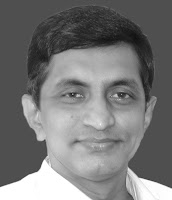The Political Whirlpool - June 2011
With corruption, money laundering and scams involving politicians making headlines, almost everyday, Politics has become a dirty word, and people love to hate politicians. Undoubtedly, politics shorn of ethics is at the root of corruption, and there is a need for changing the old order. But this transformation cannot happen unless the people of India
 |
| Dr. Jayaprakash Narayan |
In the lead article, Dr. Jayaprakash Narayan, founder and President of Lok Satta Party, calls for a serious re-examination of our definition of politics and power, and evolution of a new political culture by conscious effort. But such a transformation of politics demands the eager and effective participation of the best and brightest in society, he says.
 |
| N. Vittal |
N. Vittal, former Central Vigilance Commissioner, emphatically says that a single Lokpal Bill cannot weed out corruption, unless we improve governance, bring in transparency and accountability into our system, and free organisations of governance from political influence to deliver service.
S. Balakrishnan, senior journalist and editor, Deshbhakti Weekly, Mumbai, says that criminalisation of politics cannot be checked through legislation alone, but by powerful mobilisation of public opinion against this dangerous phenomenon.
Mukut Sah, President, Citizens for National Consensus, which has done considerable work in the field of electoral reforms, calls for few urgent electoral reforms necessary for good governance, such as tight control over election expenses, keeping tainted candidates out of the fray, the right to recall a member for poor performance, curbing the role of money to induce voters and barring rigging of elections.
Mukut Sah, President, Citizens for National Consensus, which has done considerable work in the field of electoral reforms, calls for few urgent electoral reforms necessary for good governance, such as tight control over election expenses, keeping tainted candidates out of the fray, the right to recall a member for poor performance, curbing the role of money to induce voters and barring rigging of elections.
 |
| Jashwant Mehta |
Jashwant Mehta, convener of Forum for Better Democratic Alternative, and authorof several books such as Quest for a better Democratic Alternative, advocates the Presidential form of government for better governance to end an era of hung parliaments, unstable governments and unprincipled coalitions among the political parties, who want to merely share the spoils of power.
 |
| Agatha Sangma |
Agatha Sangma, Minister of State for Rural Development, GOI, says that though it is not easy for women in politics, many have gone on to become larger than life figures, and their tales of courage and determination are today inspiring several more women to aspire to positions of power.
 |
| Abhay Mokashi, |
Senior journalist Abhay Mokashi, writes that voters do not seem to value the educational background, professional status and standing in society of independent candidates over candidates of political parties. As a result their number in the Parliament has been dwindling.
Bharat Dogra, OIOP columnist who writes on social concerns, notes that women sarpanchs are successfully contributing to the development and progress of their villages. While illiteracy and their low educational levels sometimes pose problems, it has not deterred them from playing constructive role in nation building.
 |
| Bharat Dogra |
In an interview with One India One People, Dr. Manohar Joshi, Rajya Sabha member belonging to the Shiv Sena, and former Speaker and Chief Minister of Maharashtra (1995-99) candidly shares his thoughts on politics with senior journalist Abhay Mokashi.
Know India
Great Indians’ section
Dr. Harekrushna Mahatab (1899-1987)
a journalist-author, an able administrator, a social reformer and a leading freedom fighter who associated himself with social-constructive works and made public-service and nation-building the goal of his life.
The only recipient of the highest gallantry award of Param Vir Chakra from Mumbai, Major Ramaswamy Parameswaran died at his post fighting militants in Sri Lanka
Lt. Puneet Nath Datt AC (1973-1997)
During a militant operation, Lt. Puneet Nath Datt came face to face with a militant and killed him but also succumbed to his injuries. The incident was typical but the zeal and valour of the 24-year-old hero was uncommon, who lived to his motto – Death Before Dishonour, for which he was awarded the Ashok Chakra, the highest peace time honour.









